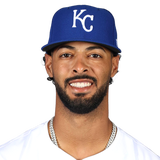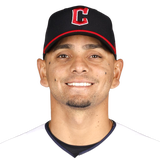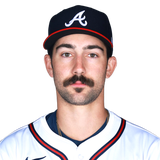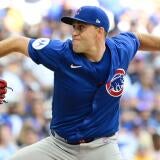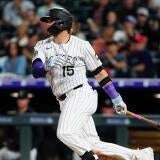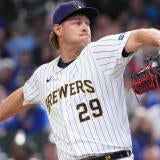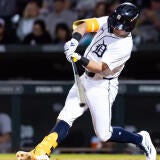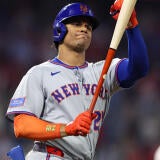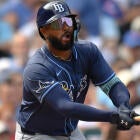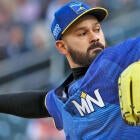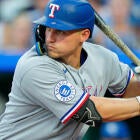2023 Fantasy Baseball Draft Prep: Bobby Witt headlines list of risky picks in Busts 1.0
Chris Towers breaks down players you should avoid at their current ADP
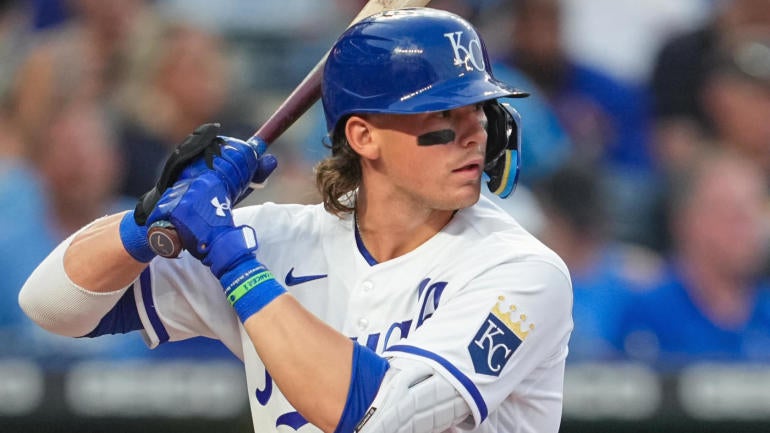
Every year, seemingly, there's some young, hot shot player who jumps way up the Fantasy Baseball draft rankings before they've really proved they're worth it.
In 2022, Luis Robert ended up with an Average Draft Position of 16.2 in National Fantasy Championship drafts on the strength of 68 really good games the prior year; in 2021, Bo Bichette went off the board at 24.47 on average coming off a 29-game sample; in 2020, it was Fernando Tatis who got pushed up to 17.4 based on his pretty remarkable 84-game debut in 2019. Those players all cost quite a bit, and two of the three worked out well, but none of them cost you as much as Bobby Witt Jr. is going to in 2023.
As of Jan. 19, there have been 241 drafts on the NFC platform, and Witt is the seventh player off the board on average, with an ADP of 7.76. And, in fairness, the sample size for Witt is quite a bit bigger to justify it – he played 150 games as a 22-year-old rookie in 2022, almost as many as the three prior examples had played combined in their collective seasons leading up to their early-round price jump.
But there's one other key difference between Witt in 2023 and Robert, Bichette, and Tatis the previous three seasons: They were all much, much better than him in their prior seasons. There was some justified skepticism because of the small samples involved, but all three of them had been legitimately great hitters leading up to their ascension of the rankings, especially when compared to what Witt managed as a rookie. Let's just compare their triple slash lines:
- 2021 Robert: .338/.378/.567
- 2019/2020 Bichette: .307/.347/.549
- 2019 Tatis: .317/.379/.590
- 2022 Witt: .254/.294/.428
That doesn't tell the whole story, of course. There were reasons to be skeptical about each of Robert, Bichette, and Tatis' production in those seasons, and the triple-slash line can't tell you that Witt was one of just two players in baseball last season with 20 homers and 30 steals. It also can't tell you that Witt is third base eligible, giving you speed at one of the shallowest positions in the game, one where steals are almost never found.
But still, it's an awful lot to ask of Witt to be worth this kind of price. According to Razzball.com's player rater, Witt was the No. 26 player in Roto leagues last season. He wasn't a bad player, by any means, but he put up pretty similar numbers to guys like Randy Arozarena (40.3 ADP) and Cedric Mullins (49.7) who are much cheaper.
You're paying a premium for a blue-chip young player, obviously, and you're paying a premium for the potential that he'll take a step forward. But it's gotta be a pretty massive one to justify taking him ahead of, among others, Shohei Ohtani, Juan Soto, and Mookie Betts. It's not unreasonable to expect Witt to take a step forward, but he's got to be much better than he was in year one to justify it.
The most obvious place Witt can take a step forward is with power. There were definite flashes as a rookie, most notably with his 92nd percentile max exit velocity. There's no question Witt has the raw power to hit for 25-plus homers, but consistency was an issue – he was 43rd percentile in hard-hit rate. That probably comes down to just picking better pitches to swing at – Witt was an aggressive swinger overall, but ranked 16th in out-of-zone swing rate, compared to 46th on pitches in the zone. Trade a few chases for a few more swings at pitches in the zone, and it's not hard to see Witt taking a big step forward.
But it's no sure thing, and your first-round pick probably needs to be a sure thing. I don't mind taking a flier on Witt in the second round, once I've secured an elite anchor for my team. But pushing Witt as high as he's going right now just doesn't make much sense to me. It's paying a premium for speed, which may not matter as much in 2023, given the rule changes that figure to lead to a boost in stolen base attempts around the league.
Which is all to say … yeah, I'm calling Witt a bust candidate for 2023. That doesn't mean he's definitely going to disappoint – betting on an elite young player who has already established a pretty high baseline of performance has been a pretty good idea over the past few seasons. But at the price he's carrying right now, I just can't justify it. There's just too much volatility without enough payoff potential.
Here are some other bust candidates for 2023, with ADP data from NFC drafts through Jan. 20:
I've joked for years that, if you have a pulse and are catcher eligible, you're going to be Fantasy relevant. And, well, Melendez has a lot more than a pulse. This is a guy who hit 18 homers in 129 games in his MLB debut and figures to play more than your typical catcher between the DH spot and outfield. He hit 41 homers in 124 games in the minors in 2021, too, so it's not unreasonable to think there's more upside than he showed as a rookie. But, like with his teammate, he's currently being drafted with the assumption that he'll take a big step forward, and there's just no guaranteeing that. He's going inside the top 100 at 98.7, and I just can't justify that price for a guy with Melendez's batting average floor. He hit .217 last season, and while his .237 expected batting average was a bit better than that, it still seems fair to assume he'll be a drag on your average. That isn't a terrible thing at catcher, but it is if you spend a top-100 pick on him. Maybe he hits 30 homers and it doesn't matter, or maybe he makes enough adjustments to get to a .250 average you can more readily live with. If Melendez falls outside of the first 10 rounds, I'm cool with him, but at his current price, it's just taking on way too much risk.
| ||||||||||||||||||||||
Andres Gimenez was one of the best post-hype sleepers in the league last season, turning in an age-23 breakout season, and he provides some pop and speed at one of the weakest positions in the game, so it makes sense that he's gotten pushed into the top 90 in ADP in the early going. But I'm worried his breakout was at least a bit of a mirage, and the underlying numbers back it up. He's a decent contact hitter, but by no means an elite one, with a 20.1% strikeout rate; combine that with good speed, and it's not unreasonable to think he can continue to be a helpful source of batting average – though his .257 expected average last season suggests his .297 actual mark probably won't be sustainable. However, the bigger concern I have comes in the power department. Gimenez hit 17 homers in just 557 plate appearances, but he did that with a 29th percentile average exit velocity and 36th percentile hard-hit rate, leading to a .143 expected isolates slugging percentage that was again outstripped by his actual .169 ISO. Gimenez also shocked by hitting .336/.400/.487 against left-handed pitchers, but his expected stats were again outpaced by what he managed – against lefties, he had a .250 expected average and .385 expected slugging percentage. That's probably enough to keep him from being a platoon player, but it's probably enough to drag down the overall profile. Gimenez is young enough that he could continue to grow, but as is, I'm not sure there's much difference between him and someone like Jean Segura (ADP: 241.45)
| ||||||||||||||||||||||
Taylor Ward's overall numbers look pretty solid, and they're backed up for the most part by his underlying metrics. But I find it hard to buy, given how hugely frontloaded his production was – he hit 10 of his 23 homers in April and May, managing just a .259/.325/.404 line from June 1 on. And he needed another hot September to even get there. Ward was a .230/.305/.388 hitter across 534 plate appearances between 2018 and 2021 and was more like a high-.700s OPS bat in the minors until an age-24 breakout at Double-A, too. Which is all to say that, April and May stand as the pretty clear outliers for his career, and I'm just not willing to pay the price to find out if that was real.
| ||||||||||||||||||||||
I find Bader's price kind of baffling right now. He was a decent player in 2020 and 2021, but hardly a special one – he hit .258/.327/.457 with 20 homers and 12 steals in 153 games across those two seasons. He was quite a bit worse than that last season, at least until the playoffs, when he clubbed five homers in nine games across two series. Is that what's pushing him into the first 15 rounds in drafts? That and the 17 steals in just over a half-season, which surely has some dreaming of a potential 20-30 outcome for Bader. But he's a weak hitter (career .225 xBA, .378 xSLG) with plate discipline issues, and he attempted just three steals across 25 games with the Yankees, so I'm not sure his steal totals with the Cardinals are worth chasing, especially since he missed so much time with plantar fasciitis, a foot injury that has a tendency to linger. Outfield is weak, but I just can't see myself buying Bader at this price, especially with speed likely to be at least of a premium this season.
| ||||||||||||||||||||||
Strider was, on a per-inning basis, perhaps one of the five best starters in baseball, and his numbers are by no means inflated by the time he spent in the bullpen. In his 20 starts, Strider allowed a .183/.252/.274 line with a massive – I mean, a truly bonkers – 38.1% strikeout rate. It feels like he's in a similar spot to Shane McClanahan a year ago, and if Strider gives us 166.1 innings of a 2.54 ERA and 0.926 WHIP, it'll be hard to argue too much even with a top-six cost among starting pitchers. But 166.1 innings would also be the most Strider has ever thrown by nearly 40, so it sure feels like taking him where he's going right now feels like you're taking him pretty near his ceiling. I don't have many doubts about the skill set, but Strider is also basically a two-pitch pitcher – he threw his changeup just 4.8% of the time last season – and it's fair to wonder how he'll hold up being asked to go six innings the entire season. Can he do it? He's talented enough, clearly. But if I'm going to take a pitcher in the first few rounds, it's going to be someone who has proven they can at least hit the 180-inning mark.
| ||||||||||||||||||||||
I have little doubt Glasnow is going to be an excellent pitcher when he's healthy. He's thrown 268.1 innings since getting traded to the Rays with a 3.05 ERA and 34.3% strikeout rate. When he's on, Glasnow is an incredible pitcher, and he's rarely not on. The problem is, those 268.1 inning have come across parts of five seasons, and it's probably not just bad luck that has felled him – this isn't a Chris Sale situation, or something. In his major-league career, Glasnow has been placed on the IL with the following injuries: right shoulder (2016, missed a month), right forearm (2019, missed four months), and right elbow (2021, missed 15 months with Tommy John surgery). Maybe the surgery fixed the underlying issue – for what it's worth, Glasnow blames the sticky-stuff ban in 2021 with the elbow injury that ultimately caused him to need surgery – but the fact of the matter is, Glasnow hasn't thrown more than 88 innings in a season since 2018 at this point. If the price was cheaper, it'd be easier to stomach, but I can't see myself doing it with a top-100 pick.
| ||||||||||||||||||||||
Last season, only 17 starting pitchers threw a pitch at least 100 mph. That alone makes Greene an outlier, but that doesn't even begin to cover it. Those starters threw 756 pitches at least 100 mph, with Greene accounting for 337 of them – 44.6% of the total. We've never seen a starter throw as hard as Greene, which makes the fact that his fastball is, at least at times, a weak point in his game even harder to understand. Greene gave up 17 homers with his four-seam fastball, as opposing batters put up a .371 wOBA against the pitch – that's in the 73rd percentile among all four-seamers in 2022. Consider that he had a near-elite 28.3% whiff rate with the pitch, and that number is even worse – when batters made contact with his fastball, they tended to crush it. Greene's slider was an excellent pitch, but his changeup barely flashed swing-and-miss potential and got hit plenty hard, too, so this is a pretty serious issue. If you equate velocity with potential – and I think we generally do – it's not hard to see how Greene's upside makes him worth betting on. Greene was dominant in his return from a shoulder strain in September, striking out 37 and allowing only three runs in 23 innings over four starts, so there's definitely plenty of players better that was the start of him figuring it out. I just can't justify the price he's going to cost to find out, given how severe the flaws in his game are.
| ||||||||||||||||||||||


